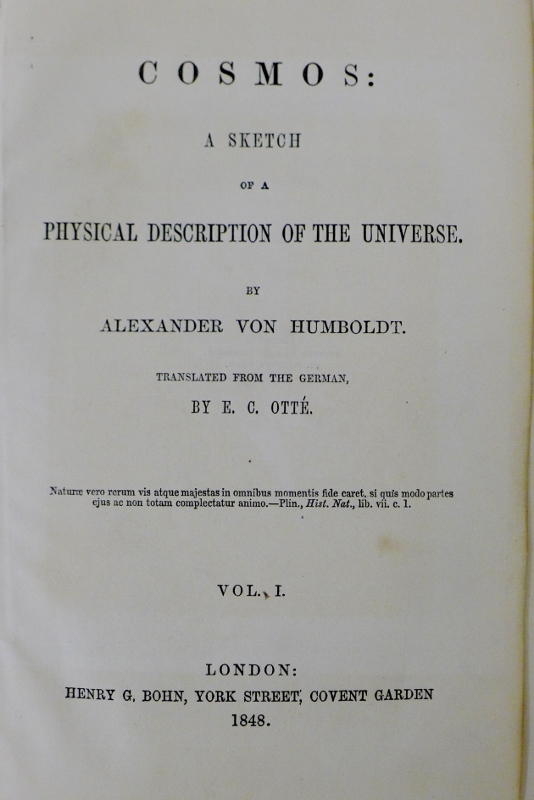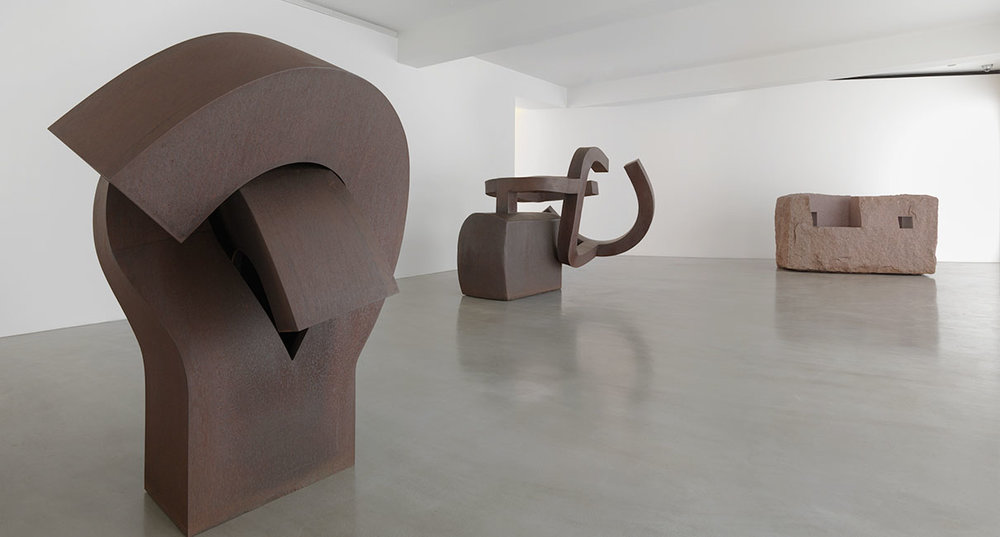Recently discovered in Galerie Edenek Sklenar in Prague.
Robert Frost
Two Look at One
Love and forgetting might have carried them
A little further up the mountain side
With night so near, but not much further up.
They must have halted soon in any case
With thoughts of a path back, how rough it was
With rock and washout, and unsafe in darkness;
When they were halted by a tumbled wall
With barbed-wire binding. They stood facing this,
Spending what onward impulse they still had
In One last look the way they must not go,
On up the failing path, where, if a stone
Or earthslide moved at night, it moved itself;
No footstep moved it. 'This is all,' they sighed,
Good-night to woods.' But not so; there was more.
A doe from round a spruce stood looking at them
Across the wall, as near the wall as they.
She saw them in their field, they her in hers.
The difficulty of seeing what stood still,
Like some up-ended boulder split in two,
Was in her clouded eyes; they saw no fear there.
She seemed to think that two thus they were safe.
Then, as if they were something that, though strange,
She could not trouble her mind with too long,
She sighed and passed unscared along the wall.
'This, then, is all. What more is there to ask?'
But no, not yet. A snort to bid them wait.
A buck from round the spruce stood looking at them
Across the wall as near the wall as they.
This was an antlered buck of lusty nostril,
Not the same doe come back into her place.
He viewed them quizzically with jerks of head,
As if to ask, 'Why don't you make some motion?
Or give some sign of life? Because you can't.
I doubt if you're as living as you look."
Thus till he had them almost feeling dared
To stretch a proffering hand -- and a spell-breaking.
Then he too passed unscared along the wall.
Two had seen two, whichever side you spoke from.
'This must be all.' It was all. Still they stood,
A great wave from it going over them,
As if the earth in one unlooked-for favour
Had made them certain earth returned their love.
Iris By Night
One misty evening, one another's guide,
We two were groping down a Malvern side
The last wet fields and dripping hedges home.
There came a moment of confusing lights,
Such as according to belief in Rome
Were seen of old at Memphis on the heights
Before the fragments of a former sun
Could concentrate anew and rise as one.
Light was a paste of pigment in our eyes.
And then there was a moon and then a scene
So watery as to seem submarine;
In which we two stood saturated, drowned.
The clover-mingled rowan on the ground
Had taken all the water it could as dew,
And still the air was saturated too,
Its airy pressure turned to water weight.
Then a small rainbow like a trellis gate,
A very small moon-made prismatic bow,
Stood closely over us through which to go.
And then we were vouchsafed a miracle
That never yet to other two befell
And I alone of us have lived to tell.
A wonder! Bow and rainbow as it bent,
Instead of moving with us as we went
(To keep the pots of gold from being found),
It lifted from its dewy pediment
Its two mote-swimming many-colored ends
And gathered them together in a ring.
And we stood in it softly circled round
From all division time or foe can bring
In a relation of elected friends.
Alexander Humboldt on describing nature.
An extract from Volume II, Cosmos.
"Descriptions of nature, I would again observe, may be defined with sufficient sharpened scientific accuracy, without on that account being deprived of the vivyfying breath of imagination. The poetic element must emanate from the intuitive perception of the connection between the sensuous and the intellectual, and of the universality and reciprocal limitation and unity of all the vital forms of nature. The more elevated the subject, the more carefully should all external adornments of diction be avoided. The true effect of a picture of nature depends on its composition; every attempt at an artificial appeal from the author must therefore necessarily exert a disturbing influence. He who familiar with the great works of antiquity, and secure in the posession of the riches of his native language, knows how to represent with simplicity of individualising truth that which he has received from his own contemplation, will not fail in producing the impression he seeks to convey;
for in describing the boundlessness of nature, and not the limited circuit of his own mind, he is enabled to leave to others unfettered freedom of feeling."

Jan Arp
"Man Seen by a Flower"
Francois Morellet

To celebrate his 90th birthday, The Mayor Gallery is showing "Les Regles du Jeu" by Francois Morellet. The work pictured was made by marking out four sets of lines each rotated 22.5 degrees from the next. The result is a dynamical feeling of rain falling on water. These highly constrained images are playful and touching and each encourages the viewer to discover the simple relations giving rise to the complexity, asking them maybe, to think like a scientist.
Chillida

Pilar Ordovas curates another thoughtful and excellent exhibit at Ordvas Gallery. Three sculptures by Chillida made in the later years of his life.

